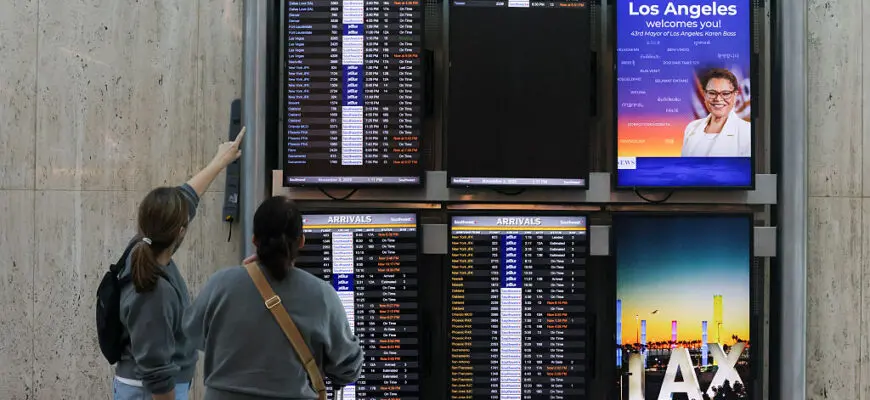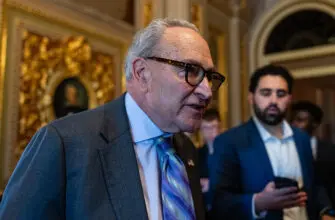The longest government shutdown in U.S. history is severely impacting air travel, leading to widespread flight delays and cancellations due to a critical shortage of air traffic controllers. In response, Transportation Secretary Sean Duffy has ordered a mandatory 10% reduction in flights at 40 major U.S. airports, citing escalating safety concerns.
The Federal Aviation Administration (FAA) is expected to formalize this directive on Thursday, with the capacity cuts scheduled to take effect on Friday. The FAA warned that further restrictions may be enforced if air traffic issues persist.
The decision comes amid unprecedented circumstances. FAA Administrator Bryan Bedford stated at a Wednesday press conference, “I’m not aware in my 35-year history in the aviation market where we’ve had a situation where we’re taking these kinds of measures. We’re in new territory in terms of government shutdowns.”
The FAA is currently short approximately 3,500 air traffic controllers, forcing existing staff to endure grueling schedules, including significant overtime and six-day work weeks. Duffy had previously voiced concerns in early October regarding the immense pressure on these essential workers.
“I want them to think about the departures and arrivals of airplanes. I want to make sure they keep Americans, and airplanes, safe,” said Duffy during a press conference at Newark Liberty International airport in New Jersey. “But they’re not just thinking about the airspace, they’re thinking about: ‘Am I going to get a paycheck?’ ‘How am I going to pay my mortgage?’ ‘How do I make my car payment?’ ‘Do I have to take a second job and drive Uber?’”
The Association of Flight Attendants-CWA issued an urgent plea on October 30 for the government shutdown to end, calling the situation an “unsustainable crisis.” They noted that air traffic controllers, TSA officers, and other mandatory workers missed their first full paycheck, adding that “more than 40 million people, including flight attendants, will lose SNAP food assistance.”
Airlines are preparing for the mandated cuts and developing support plans for affected customers.
United Airlines CEO Scott Kirby confirmed in an emailed statement that any customer traveling during this period is eligible for a refund if they choose not to fly—even if their specific flight is not impacted. This policy applies to non-refundable and basic economy tickets. United plans to provide “rolling updates” to minimize disruption and give customers “several days’ advance notice.”
United’s international long-haul flights and “hub-to-hub flying” are exempt from the FAA directive. The airline’s hub airports include Chicago O’Hare, Denver International, Guam’s Antonio B. Won Pat, Houston George Bush, Los Angeles International, Newark Liberty, San Francisco International, and Washington Dulles.
Delta Airlines stated that it “expects to operate the vast majority of flights as scheduled, including all long-haul international services,” emphasizing that safety remains its “top priority.”
The need for cuts is evident in recent data: on Wednesday alone, U.S. airports saw almost 3,900 delays and over 170 cancellations. Duffy explained that the cuts are necessary to alleviate pressure on staff who are working longer hours and more days.
FAA Administrator Bedford echoed this, stating, “We are starting to see some evidence that fatigue is building in the system… we need to work towards relieving some of that pressure.”
The 10% reduction will target 40 “high-traffic environment markets,” though specific airport names were not immediately confirmed by Duffy or Bedford. Bedford stated they would look for a “radical reduction across these 40 markets over the next 48 hours.” The duration of these restrictions will depend on data actively being examined by the FAA and Department for Transport.
These 40 airports are generally the busiest in the U.S., each having served over 5 million passengers in 2024. High-volume examples include Hartsfield-Jackson International in Atlanta (52.5 million passengers), Dallas-Fort Worth International (42.3 million), and Denver International (40 million). Chicago O’Hare, Los Angeles International, and JFK International in New York all served over 25 million passengers.
In the past week, major airports have already experienced significant disruption, according to Flight Aware:
- Hartsfield-Jackson International has seen 762 delays and 20 cancellations.
- Dallas-Fort Worth has experienced 825 delays and six cancellations.
- Denver International has dealt with 594 delays and 12 cancellations.









